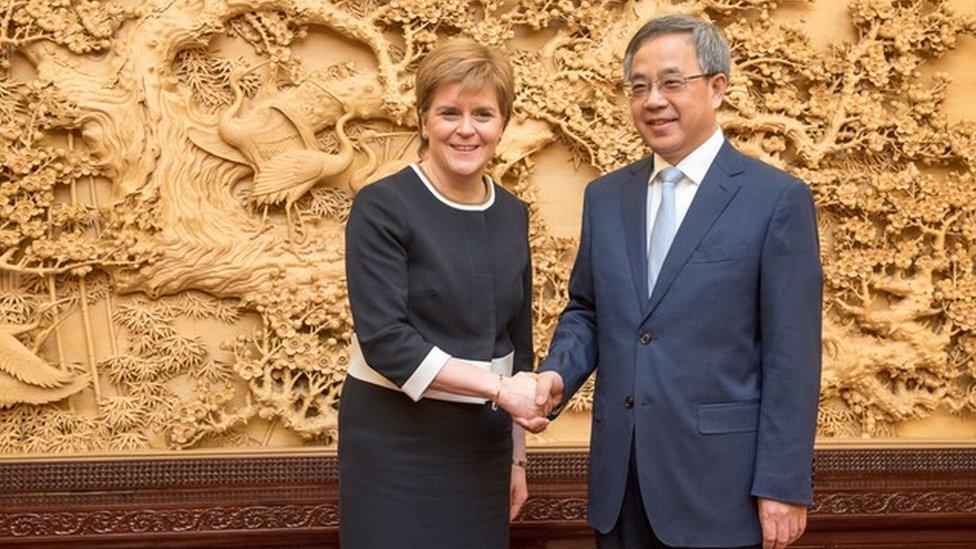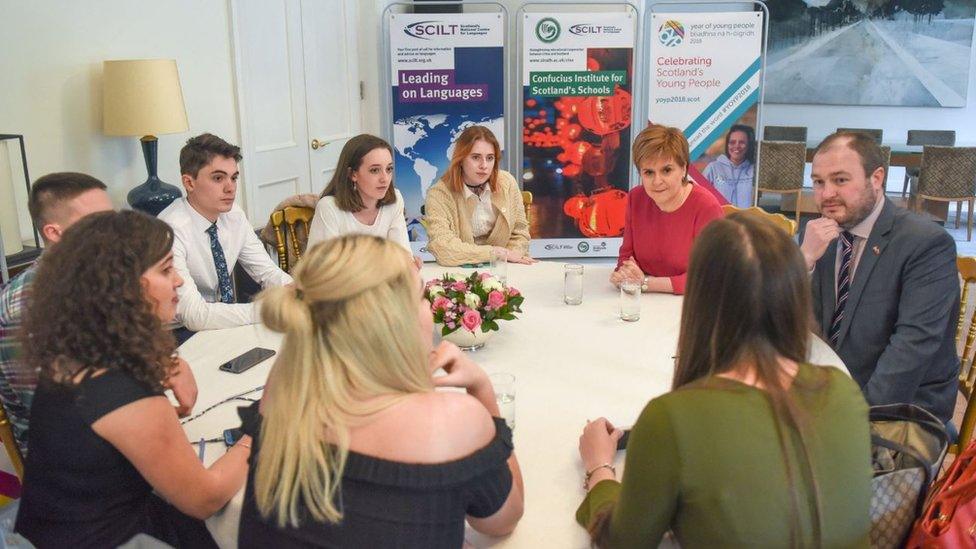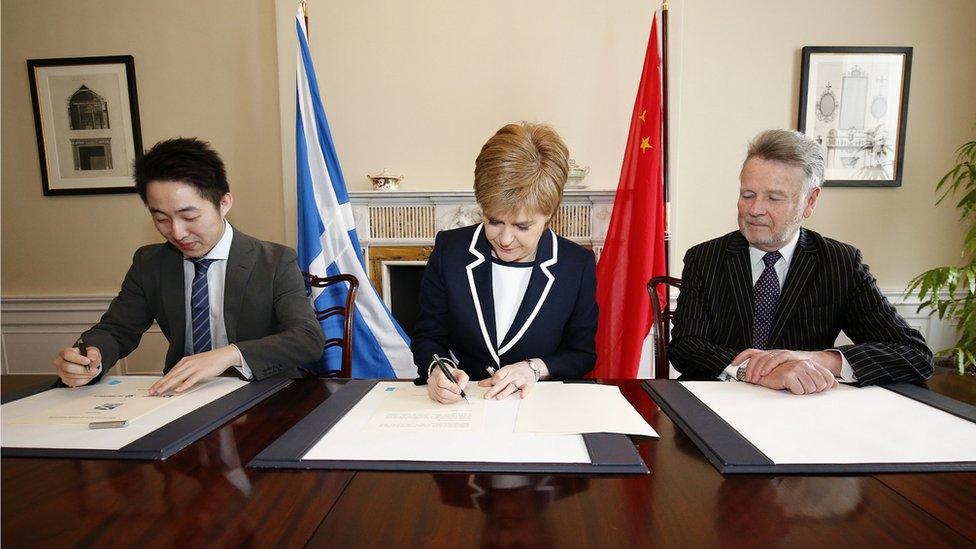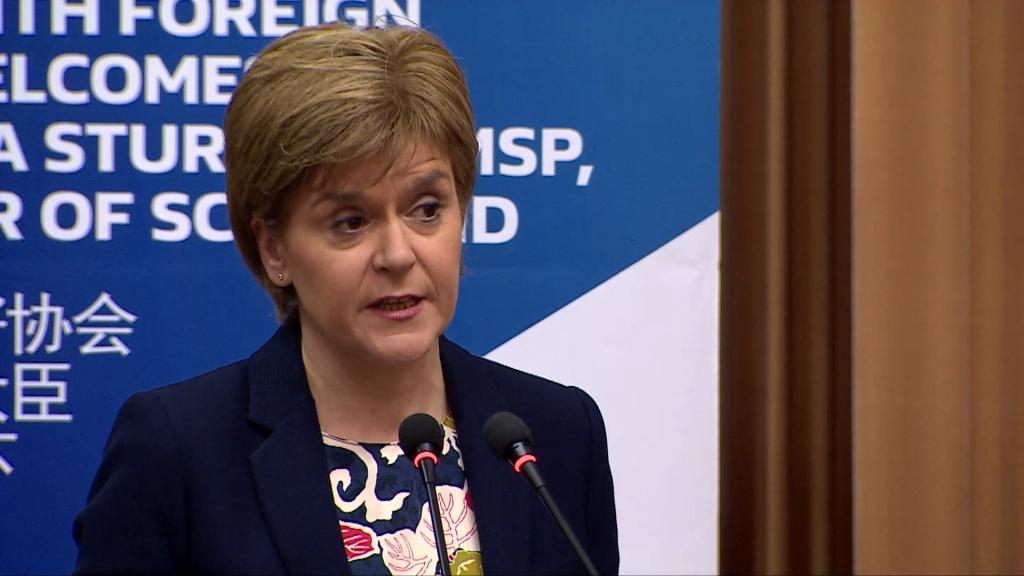Sturgeon aims to boost Scots-China trade with visit
- Published
- comments

Nicola Sturgeon discussed trade and education with China's Vice Premier Hu Chunhua
First Minister Nicola Sturgeon has met the Chinese vice premier at the start of a visit to "showcase Scottish business" in a bid to boost exports.
Ms Sturgeon's five-day trip also aims to build tourism and academic links.
She described her first meeting with Chinese Vice Premier Hu Chunhua in Beijing as "very constructive".
The first minister said they had discussed "the long-standing friendship between Scotland and China, and how we can continue to develop this".
She has pledged to raise the issue of human rights while in China, having been briefed by Amnesty International about their concerns before setting off.
On the first day of her visit, Ms Sturgeon hosted an event in Beijing to showcase Scottish produce and technology, including whisky, salmon and textile design technology used to create heart valves.
She also announced new agreements between Scottish and Chinese universities in the finance, energy and computer games sectors.
'Enormous opportunities'
The first minister said the day had underlined the main aim of the trip - closer cooperation in "trade and investment, education and culture".
Ms Sturgeon said: "There are clearly enormous opportunities for Scottish firms to do business in China. Sectors including energy, research and innovation and life-sciences all offer significant potential for growth, and I will be working to strengthen relationships in these areas throughout this week.
"Our China strategy is underpinned by promoting equality and a respect for human rights, social values and the rule of law. This is a key part of our relationship. We discussed those subjects today, and also inclusive economic growth, women's rights and children's rights - the last of which I look forward to exploring more in my UNICEF speech tomorrow."

The first minister met Scottish students who are studying in China on the first day of her trip
Ms Sturgeon also met a group of Scottish students who are currently living and studying in China, and announced a £750,000 investment to help others follow this path.
The cash will go to the Confucius Institute for Scotland's Schools (CISS) Scholarship Programme.
The institute has faced criticism in the past for its links to the Chinese education programme, which is being monitored by the FBI after concerns over censorship and academic freedom.
Ms Sturgeon was been briefed by Amnesty International ahead of her visit, and has insisted she will not shy away from bringing up the topic of human rights in China.
Rights abuses
Amnesty has urged the Scottish government to do full background checks on any Chinese firms it signs deals with.
It said this was necessary to ensure the companies - many of which are state-owned - were not involved in human rights abuses in China, which it said were among the worst in the world.
Naomi McAuliffe of Amnesty International Scotland said the group was concerned about the ongoing use of the death penalty in China - where more prisoners are thought to be executed than in every other country combined.
She also highlighted a crackdown on freedom of expression and the imprisonment of lawyers working on human rights cases.
Ms McAuliffe said: "The Scottish government needs to have a real pause for serious consideration on any deals that they are doing with China-based companies.
"Companies based in China are not just companies on their own, they're often state-owned as well. So you're dealing with the Chinese state and a lot of the human rights abuses that come along with that.
"[It is important to have] proper background checks to make sure that the Scottish government is not implicated or involved in any human rights abuses that are taking place."

Ms Sturgeon said the political row over a Scottish-Chinese investment pact signed in 2016 was "not really rooted in reality"
A political row broke out in 2016 over an investment deal Ms Sturgeon signed with state-backed Chinese companies. It was initially said to be worth up to £10bn, but ultimately collapsed - with the government blaming a "climate of hostility" from opposition parties.
The first minister signed a memorandum of understanding with SinoFortone and China Railway No. 3 Engineering Group at Bute House, but the pact came under intense scrutiny after concerns were raised over claims of corruption, external and human rights abuses.
Prior to the trip, Ms Sturgeon told BBC Scotland that the affair had not damaged Scotland's reputation in China "in the slightest", saying much of the row was "exaggerated" and "not really rooted in reality".
She added: "We listened to the concerns that were raised in parliament and have agreed to reflect on that and to make changes, and to make sure that - as we would always want to do - due diligence around things like human rights is embedded in our approach to these things."
The Scottish government has confirmed that the first minister will not be signing any memorandums on the current trip.
Lib Dem leader Willie Rennie was a vocal opponent of the 2016 memorandum of understanding, and raised the matter with Ms Sturgeon again prior to the parliamentary recess at Holyrood.
He asked if she would "do the right thing" and speak up for human rights while in China, leading Ms Sturgeon to retort that she would "bow to nobody in my determination to play my part in promoting human rights internationally".
- Published27 July 2015
